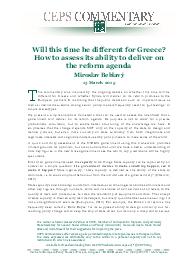Blyth, Mark, (2015), “A Pain in the Athens”, Foreign Affairs Journal, 7 July When the anti-austerity party Syriza came to power in Greece in January 2015, Cornel Ban and I wrote in a Foreign Affairs article that, at some point, Europe was bound to face an Alexis Tsipras, the party’s leader and Greek prime minister, “because there’s only so long you can ask people to vote for impoverishment today based …Read More
The Greek Vote and the EU Miscalculation
Friedman, George, (2015), “The Greek Vote and the EU Miscalculation“, Stratfor Geopolitical Weekly, 7 July In a result that should surprise no one, the Greeks voted to reject European demands for additional austerity measures as the price for providing funds to allow Greek banks to operate. There are three reasons this should have been no surprise. First, the ruling Coalition of the Radical Left, or Syriza party, is ruling because it …Read More
External conditionality and the debt crisis: the ‘Troika’ and public administration reform in Greece
Featherstone, K., (2015), “External conditionality and the debt crisis: the ‘Troika’ and public administration reform in Greece”, Journal of European Public Policy, Vol. 22, Issue 3, pp.295-314. Levering domestic reform via external conditionality has become crucial to the rescues of European Union member states in the context of the eurozone crisis. This article examines a critical case – Greece – and a problematic sector – reform of the central state …Read More
Greece’s Turn to Resist a Referendum
Mohamed A. El-Erian, (2015), “Greece’s Turn to Resist a Referendum”, BloombergView, 18 May. In 2011, overwhelming opposition from Greece’s European partners forced Prime Minister George Papandreou to withdraw a proposal for a referendum seeking a “clear mandate” from voters to carry out European Union-backed policies. Last week, the opposite scenario unfolded: Germany suggested that the Greek government hold a plebiscite on whether to accept creditors’ demands for economic reforms or ultimately …Read More
Should Greece Pay Back Its Debt?
Ozlem Onaran (2015) “Should Greece Pay Back Its Debt?“, Social Europe Journal, 23 April 2015. Financial speculators are nervously asking whether Greece will pay its debt or default. Political leaders from Europe to the US and the IMF are telling the Greek government to leave aside its democratic mandate and accept further austerity as a condition for getting credit to continue to pay back its debt. But the right …Read More
Greece: On the Gredge, A Greek exit from the euro may soon become inevitable
Greece: On the Gredge, A Greek exit from the euro may soon become inevitable, The Economist, 25 April 2015. Eventually every long-running drama, from “Downton Abbey” to “Dr Who”, feels formulaic. So it is with Greece’s debt saga. For five years it has followed a wearily familiar script of unpayable debts, aborted reforms and 11th-hour compromises that let the country stagger on inside the single currency. That history has …Read More
Modern Greece: What Everyone Needs to Know
Kalyvas, Stathis (2015), Modern Greece: What Everyone Needs to Know, Oxford University Press. Combines the most up-to-date economic and political-science findings on the current Greek crisis with a discussion of Greece’s history Greece’s economic and political future as a member of the European Monetary Union is very unpredictable at the moment, though the decision will have great repercussions for the rest of Europe and the world Makes original historical connections between …Read More
Will this time be different for Greece? How to assess its ability to deliver on the reform agenda
Beblavý, Μ. (2015) “Will this time be different for Greece? How to assess its ability to deliver on the reform agenda“, Centre for European Policy Studies (CEPS) Commentary, 13 March. Τhis commentary was inspired by the ongoing debate on whether this time will be different for Greece and whether Syriza will deliver on its reform promises to the European partners. It is striking thatthe public debate on such an …Read More
The Greek Surge against Austerity: A Blessing or a Curse for the Eurozone?
Panagiotarea, Eleni (2015) “The Greek Surge against Austerity: A Blessing or a Curse for the Eurozone?“, Heinrich-Böll-Stiftung – European Union, 08 April 2015. Syriza’s advent of power was supposed to seriously challenge the eurozone’s austerity orthodoxy and put an end to an economic adjustment programme, which saw Greece’s GDP fall by 25 per cent and unemployment rise by 26 per cent. The radical-left populist party was instrumental in exploiting …Read More
Blame and Punishment? The Electoral Politics of Extreme Austerity in Greece
Rüdig, W. & Karyotis, G. (2015) “Blame and Punishment? The Electoral Politics of Extreme Austerity in Greece“, Political Studies Association, Vol. 63, Issue 1, article first published online: 13 September 2013, pp. 2-24. Can governments that introduce extreme austerity measures survive elections? Contrary to economic voting expectations, the PASOK government in Greece initially appeared to cope quite well, claiming victory in regional elections in 2010 despite widespread anti-austerity protests. …Read More







